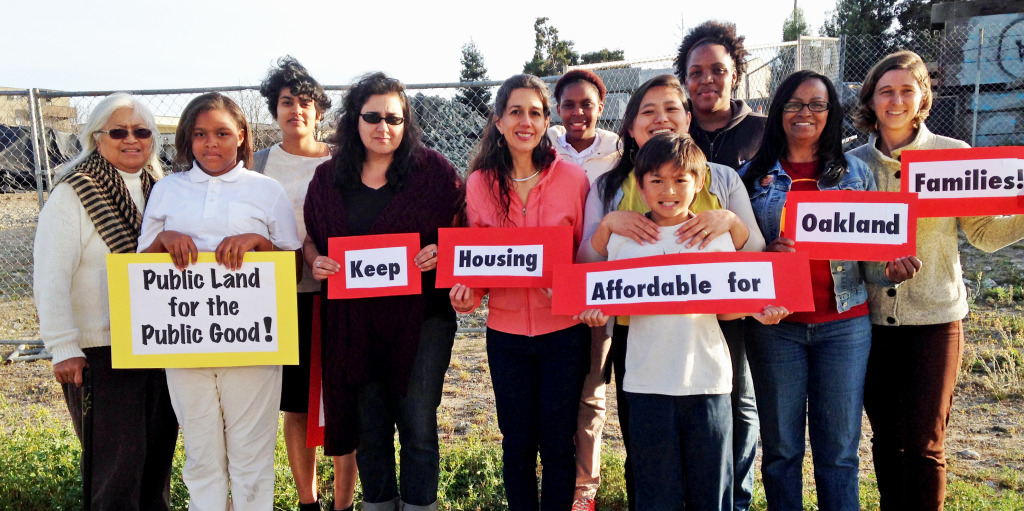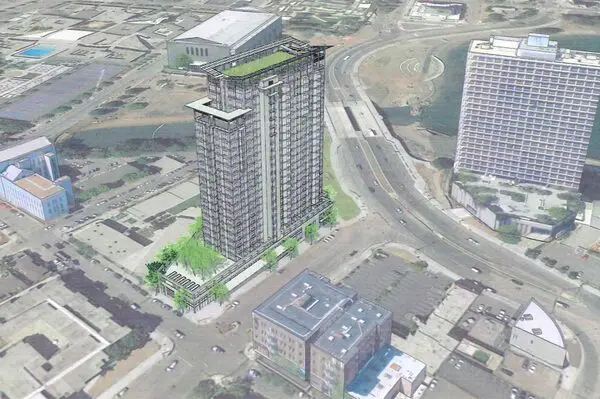Residents Oppose Proposed Luxury Apartment Tower on East Side of Lake Merritt
Mar 26, 2015
Posted in Economic Development, Gentrification, Housing/Foreclosures

By Ken A. Epstein
Local residents are organizing to attend the Wednesday, April 1 meeting of the Oakland Planning Commission to oppose the proposed sale of public land on East 12th Street across the roadway from Lake Merritt to a development company that wants to build a 24-story, 298-unit luxury apartment tower with rents that will go for about $3,000 a month.
The residents, who belong to a neighborhood group called East Lake United for Justice, are urging the city to reject the sale of the parcel. They are saying public property should only be used for the “public good,” not sold to developers for a one-time profit.
“We feel public property should be used for public benefit,” said Amy Vanderwarker of the East Lake United.
“We are renters and homeowners who are concerned how this tower will lead to a rise in rents and will lead to displacement and is part of the rising tide of gentrification in Oakland,” she said.
“We are going to lose our diversity, our depth of culture,” if gentrification is allowed to go ahead, said Vanderwarker. “East Lake is one of the areas in the city that is just barely affordable. The area around the lake should be maintained for the public, not just people who can afford $3,000 a month.”

The developer who wants to purchase the property from the city is Ronnie Turner and his company Urban Core. In addition to the 298 residential units, the project would include a cafe, parking, seven townhouse units and a lounge area.
Seeking to answer community criticisms, Urban Core recently started a petition on Change.org, a web-based site for writing and publicizing petitions, calling on Oakland residents to support the project as a way to “increase housing supply and the growth of Oakland’s economy.”
The company defended the market-rate price for its units: “Rents (not for-sale condos)…are in the $3,000-per-month average, which is well below the San Francisco market,” the petition said.
“This project will not increase gentrification and displacement in Oakland, but by adding a new supply of units, offers an opportunity for balanced growth, given the increased market demand for living in Oakland’s growing community,” according to the petition.
The petition added: “The development of the project will contribute new market-rate housing to the city that adds to the housing stock providing opportunities for new residents to the city, and further options for those existing residents seeking to live near one of Oakland’s finest amenities – Lake Merritt.”
A mix of unit types is proposed, including seven lofts, eight penthouse units, 113 studios, 110 one-bedroom units and 60 two-bedroom units. Parking would be available for some of the residents, with spaces for 209 cars and 86 bicycles.
City staff is expecting to sell the land for $4 million and has included the proceeds in Oakland’s 2013-2015 budget, according to the staff report.
City staff noted that community members are asking that the project provide more community benefits, especially affordable housing. “(But) there is no requirement in the Planning Code requiring that the project provide affordable housing,” the report said.
In response to the criticism of the lack of community benefits, the report said, “The developer has agreed to include designing, improving and maintaining the (nearby) stormwater treatment facility. The developer has also agreed to not sell condominium conversion rights from the project site.”
The .92-acre parcel – adjacent Dewey Academy, a public high school – was created during the construction projects related to Measure DD, a $198 million bond passed in 2002.
Measure DD, which was financed by taxpayers, paid for the renovation and restoration of the western end of Lake Merritt and the Lake Merritt Channel, the narrowing of the roadway between the convention center and the lake, and the connecting of the two properties by pedestrian bridges.
The Oakland Planning Commission is scheduled for Wednesday, April 1 at 6 p.m. in Hearing Room 1 of Oakland City Hall.